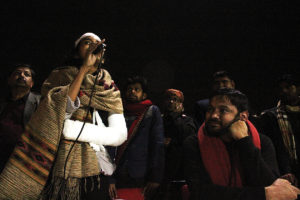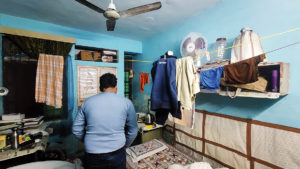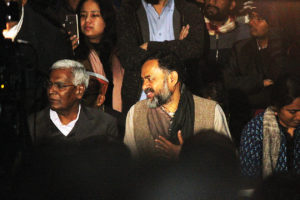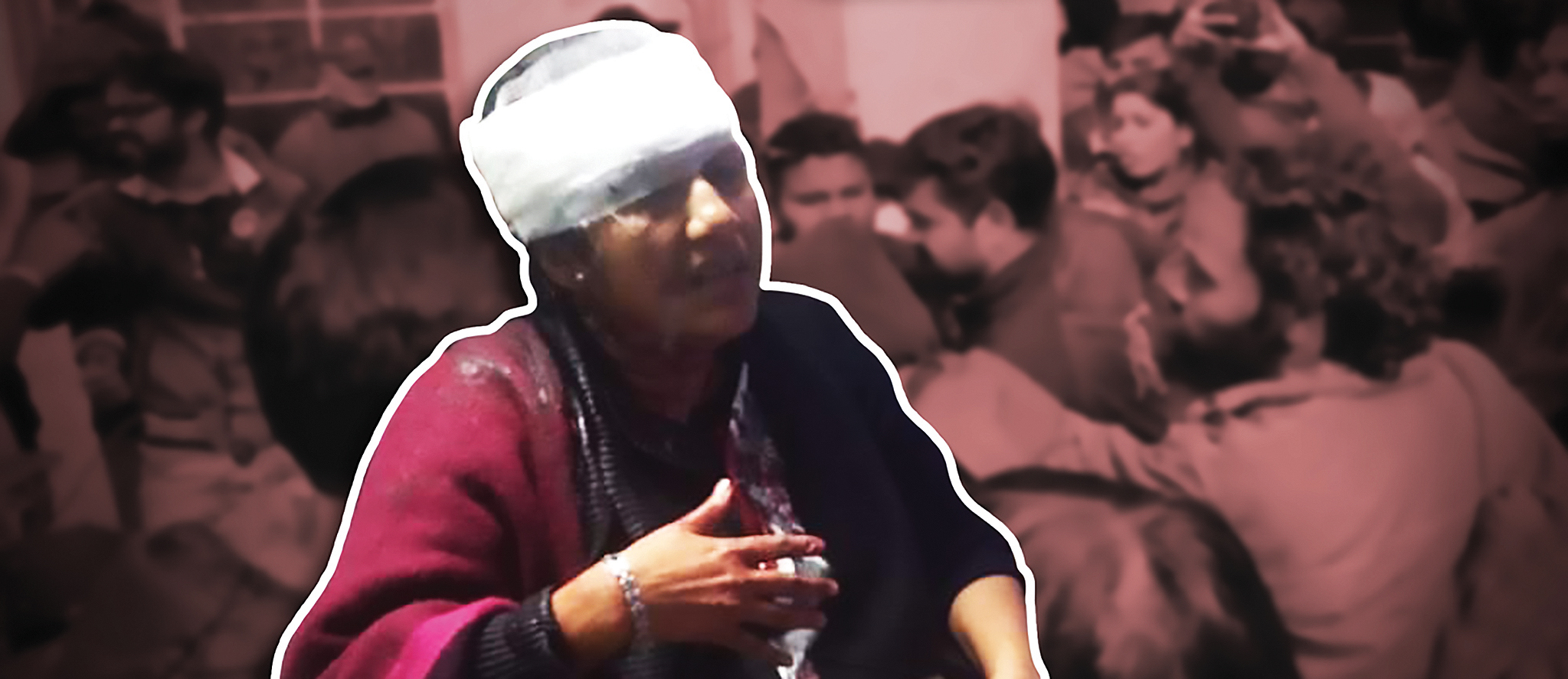As right-wing mobs ran riot at JNU on the night of January 5, students allege they were victims of a targeted attack inside the university
IN THE middle of a Delhi winter, the temperature at Jawaharlal Nehru University on the evening of January 5 rose dramatically. At around 6 pm that day, a violent mob wreaked havoc inside the university: beating professors and guards, abusing and assaulting students, and breaking doors and windows. The situation subsided by 8 pm.
The main gate of the university was closed by Delhi Police, which looked on as groups of rowdy men outside chanted slogans, attacked journalists and beat up JNU students. Students, mostly those affiliated with the Left, took over this space by 11 pm, as pedestrian harassment was replaced by loud ‘slogans of ‘Azadi’. The police held a flag march inside the campus and exited the university by 3.10 am.
‘EVERYONE RAN FOR THEIR LIVES’
“They came to Periyar hostel first around 6 pm, these men with masks who wore shawls,” said a student who stays at one of the hostels, on the condition of anonymity. “I was sleeping in my room. The mob was only targeting some people and thrashing them. I ran and went to my friend’s hostel.”

The student then described the second wave of attacks. “By the time it was 7-7.30 pm, we thought things had calmed down. Students were scared so they came out on the streets. But then the mob arrived at Sabarmati hostel and they started beating anybody and everybody,” the student said. “They had no time to distinguish someone from anyone. They had masks and wore shawls. Many of us ran to the hostels and others hid in the woods. I was there myself in the woods for more than an hour.”
DK Lobiyal, the president of the JNU Teachers’ Association, stated that he was holding a peaceful meeting near the Sabarmati hostel when a mob with sticks and hammers marched towards the site from the Periyar hostel.
“The teachers created a human chain when they heard about the approaching mob from Periyar,” he said. “But they were pelted with rocks and hit with lathis by the mob. Everyone ran for their lives. Six teachers were injured. Then they roamed the campus. It was complete terror.”
When asked who he suspected these men were, Lobiyal said the men did everything in the presence of a passive police force, so “one can guess who it was”.
At 8 pm, students said, the Delhi police closed the main gate to university students but allowed masked men to enter from the Saraswatipuram gate 100 metres ahead. “I was returning from Munirka with groceries at around 8.15 pm when the police refused to allow me to enter the campus from the main gate,” said Jyoti, a student. “So I walked ahead to the Saraswatipuram gate. There, men shouting ‘Bharat Mata ki Jai’ slogans were allowed to enter by the police. But when I tried to enter on my scooter, I was let in only after furnishing identification.”
‘WE SWITCHED OFF THE LIGHTS SO THAT THEY WOULDN’T HARM US’
Naushad MK, a PhD student in Discrimination and Exclusion Studies, found his room on Sabarmati’s second floor torn apart when he returned there late in the evening. The floor was littered with shattered glass. “The minorities and the students belonging to the left-wing political groups were attacked. It is very clear as some other rooms are left untouched,” he said, implying rooms of students associated with right-wing groups remained pristine.
Room numbers 156 and 157 of the hostel, occupied by Kashmiri students, were ransacked completely. “Around 7.30-8 pm, a handful of people entered the hostel with sticks and rods. Our room’s glass panel on the top of the doors were broken first,” said a Kashmiri student. “The goons first broke into 156 and those caught inside jumped into 157 through the balcony. The goons tried to break the door of room number 157.”
The targeted attack was confirmed by the students whose rooms were untouched. “Being a Hindu male is a privilege which worked for me,” a student told us. “Moreover, I don’t belong to any political party.”
“They were outsiders, not JNU students,” said another eyewitness, a student, her voice shaking with anxiety. “The moment we realised that, we ran into our rooms in the Sabarmati hostel and locked it from the inside. There were 8 of us in the room. We switched off the lights so that they wouldn’t harm us. We could hear banging doors and abusive men, and we were very scared. This went on for 20 minutes. We came out only after a disquiet had pervaded the hostel.”
Kundan Devan, a PhD student and a hostelite at Sabarmati, claimed that students injured themselves while jumping off the balconies in a bid to escape.
Suryaprakash is a blind research student living on the ground floor of Sabarmati hostel, which is now strewn with broken glass. He was working on his laptop and listening to music when the mob arrived at 6.50 pm. “My door rocked loudly. The glass above it was smashed with a rod and a piece of it hit my head,” he said. “I wore a hoodie else I would have been seriously harmed.”
The mob then entered Suryaprakash’s room and hit him on his arms and his back. “I screamed when they assaulted me. They then realised that I was blind and left me alone. Some of them said I was lying and that I could see. The only thing these people wanted was to teach a lesson in terror.”

Suryaprakash, who is an athlete, was taken to the All India Institute of Medical Sciences by fellow students. He was given first aid and returned to the campus by 11.15 pm. “I’m afraid the police is involved in this. They stood by and watched. Some of my female friends complained to them out of fear, and they just asked others to make videos of her,” he told Newslaundry.
As we got ready to take a photograph of Suryaprakash in his room, he turned his back on us. “I am concerned about my safety,” he said.
Students and teachers at JNU told Newslaundry that the mob’s motivation to perpetrate terror could be traced to the events of the previous day. The university had scheduled its registration process for the winter semester between January 1 and January 5 this year. Students protesting against the recent fee hikes had shut down the WiFi in the university on Saturday, January 4. The Akhil Bharatiya Vidyarthi Parishad, a student outfit of the Rashtriya Swayamsevak Sangh, tried to restore the WiFi when a scuffle broke out between the two groups.
Videos of the scuffle obtained by Newslaundry purportedly show ABVP students carrying sticks and rods and attacking other students outside the Communication and Information Services office on January 4.
The JNUSU had made similar allegations against the ABVP, as reported by The Times of India on January 5.
‘SAY BHARAT MATA KI JAI’
At 9 pm, the Nelson Mandela Marg outside JNU’s main gate was in complete darkness. The street lights were off and some 50 people were sloganeering ‘Vampanti murdabad‘ and ‘Desh ke gaddaro ko goli maaro salo ko‘. The sloganeering was aimed at students on the other side of the main gate, now closed, and the professors who stood in solidarity with them.
The mob was chaotic, often abusive. When Yogendra Yadav, head of Swaraj India and a former JNU student, tried entering the university, he was called a terrorist and asked to move back. He was escorted away by the Delhi police.
“I am trying to talk to students in a peaceful manner,” Yadav told the media. “The students and professors are stranded on the other side of the gate. These ABVP goons attacked me and tried pushing me. Rather than stopping the students or controlling them, police dragged me outside.”
Reporters at the site were also heckled and assaulted. An India Today reporter, while accusing the Delhi police of inaction in his on-air report, was thrashed and chased away by a mob that accused him of being a “naxalwadi” and “deshdrohi”. As one of us ran behind the chasing mob, we were shoved and asked our identities. “Say Bharat Mata ki jai,” we were told.
Later, another Newslaundry reporter was intimidated by these men, who asked us to remember the website’s past reports on Kanhaiya Kumar.
“I was doing my job,” the India Today reporter later told Newslaundry. “They began assaulting me and I tried to run. They chased me and beat me up. Our channel has been heckled in the past by JNU and Jamia students but we were never attacked.”
Between 9 and 10 pm, bursts of violence broke out outside the JNU main gate between right-wing elements and JNU students. The latter were easily overpowered. When some female students confronted the rowdy men, they complained to the police: “Look, these women are trying to beat us. You know what will happen when we decide to reciprocate, right?”
The police stood quietly in a state of zen, observing the ruckus. “Delhi Police zindabad,” the mob chanted.
The Delhi Police declined to comment on the situation despite repeated requests by Newslaundry. “Everything is normal,” the Special Commissioner of Police told us.
The only way to get inside the campus was through the Saraswatipuram gate 100 metres away from the main gate of JNU. When our reporters reached the site, the students had gathered outside as they felt safer outside with their friends than inside the hostels. The Sabarmati hostel had broken glass piled at every corner, reminders of the horror that took place a few hours ago.
The mob had entered both the boys’ and girls’ wings in Sabarmati. One fact that didn’t go unnoticed is they selectively targeted a few rooms and left others unharmed.
Coincidentally, when the alleged ABVP mob disappeared after the students opposing them outnumbered them, the streets were well-lit again. When the police were asked about this, they pointed towards a “technical glitch”.
Lawyer Vrinda Grover, professor Ira Bhaskar and activist Bezwada Wilson were among the people who were standing in solidarity with the students inside the campus. “We are here to protest against every brutality against students and also to show that we are with every student fighting for their rights,” Bezwada Wilson told Newslaundry.
‘WHERE WERE YOU WHEN WE WERE ATTACKED?’
Students and teachers at JNU accused the ABVP of orchestrating the violence inside the university on Sunday night. Newslaundry talked to JNU ABVP president Durgesh Kumar about this.
“ABVP is a small organisation in JNU,” Kumar said. “We have 100 to 150 functionaries here. On the other hand, the Left is a big organisation. Will ABVP try to kill so many in their organisation? Roaming around the campus in masks: whose custom is it? On February 9, 2016, Leftists had raised anti-national slogans after masking themselves. This is their old practice.”
Kumar pinned all blame on the Left. However, he lamented the series of events that occurred in JNU on Sunday. “What happened today is very sad. Such an incident should not have happened. The JNUSU has maligned student politics. The student council opposes it and will continue to do so.”
When told that recognisable ABVP workers were harassing JNU students and journalists at the university’s main gate, Kumar responded that none of the ABVP workers were outside. “All are hidden here and there,” he said.

At 1 am, the Delhi police opened the university’s main gate and conducted a flag march inside the campus. The right-wing mobs at the main gate had dissipated by now, and students led by the Left were raising slogans against the Modi government and the police. The street lights were back on.
The police was heckled by JNU students as it marched inside. “Where were you when we were attacked? Why didn’t we see the police when we had called you in the evening?” the students asked. “Why do you need to be here now?”
They also urged the police to visit the vandalised hostels to collect evidence. The police responded that it already had enough evidence.
Some students expressed dismay by gathering by the road and humming the now controversial “Hum dekhenge” by Pakistani poet Faiz Ahmed Faiz.
Halfway through the march, a company of the police forces turned back towards the main gate. The rest were stopped on their way by students who sat on the road and insisted that the police did not move any further. The forces, wearing riot gear, moved to the pavement. They were stopped once again, this time 100 metres away from the university’s administrative block. As the sloganeering by students loudened and the media trickled in, the police company, led by the Special Commissioner of Police, turned back.
Delhi Police’s dose of student discontent did not stop here. When it gathered at the main gate around 2.30 am, members of the JNUSU turned aggressive, asking how the police presence in the campus was justified. One student, demanding a senior police officer present the order that permitted him to enter the campus, wagged a finger in the officer’s face and told him that he “couldn’t produce the order because you don’t have it”.
“We need the order because the campus is ours. You are a public servant, you are supposed to serve the public. It is your duty,” she said.
Other students were more polemical. “You behave like this because you drink gau mutra,” one student told a police officer.
At 3 am, to cheers and applause from a handful of JNU students, the Delhi police exited the campus. As they left, one student jeered, “Don’t create a ruckus. Make a line and step out peacefully.”
www.newslaundry.com





